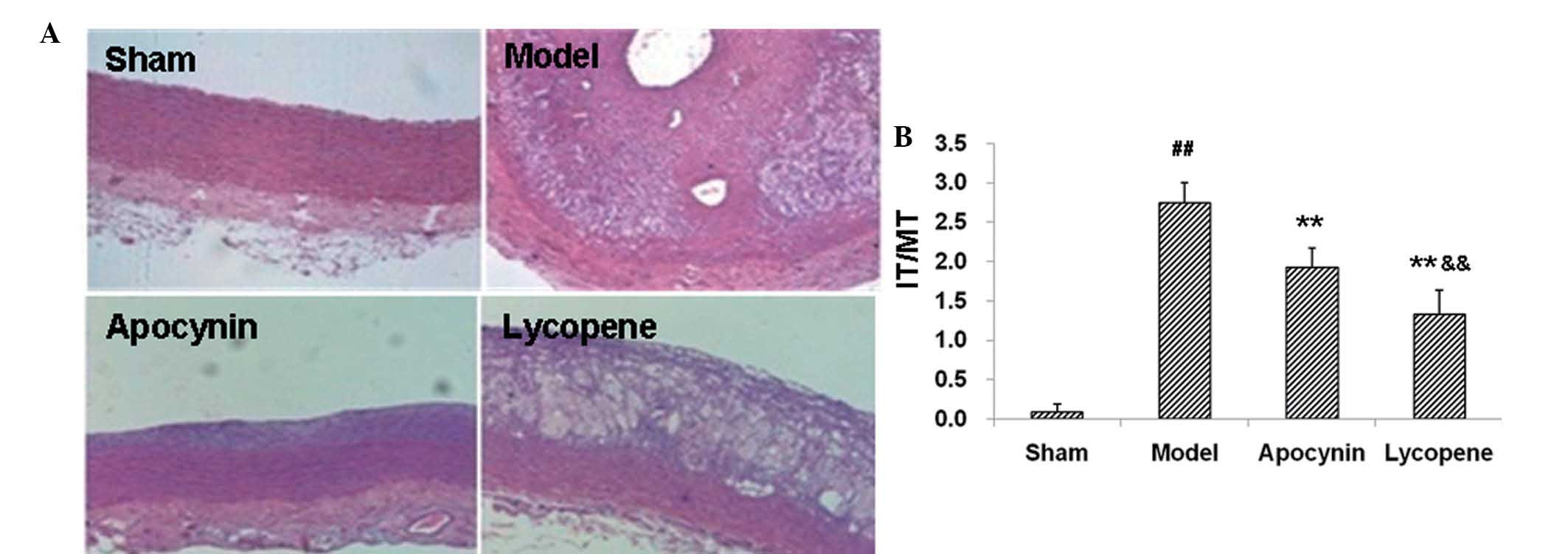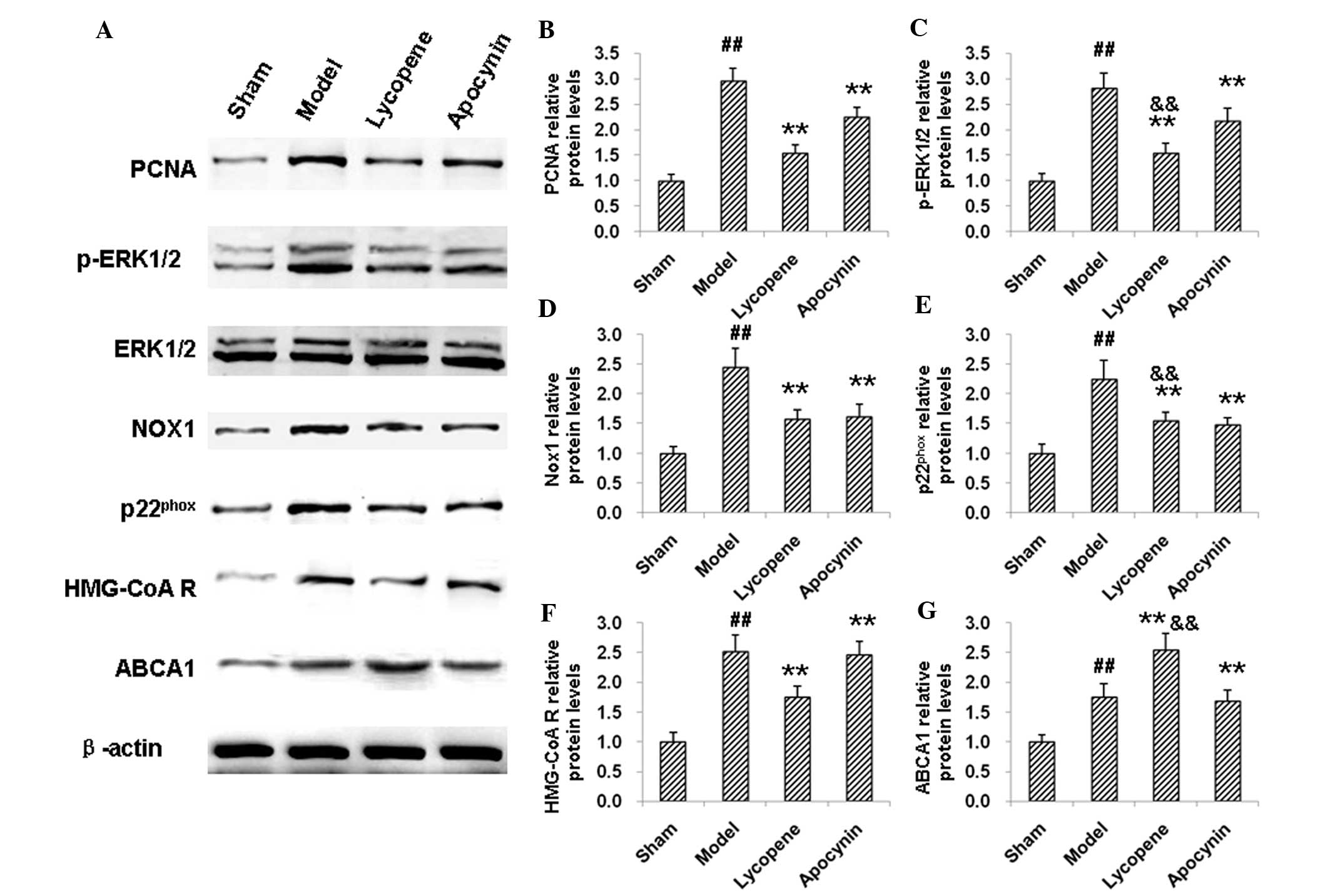|
1
|
Model LS and Dardik A: Neointimal
hyperplasia: Basic considerations. Haimovici’s Vascular Surgery.
Ascher E: 6th edition. Wiley-Blackwell; West Sussex, England: pp.
178–196. 2012
|
|
2
|
Gao C, Xu W, Xiao W, Yu J and Li M:
Simvastatin decreases stent-induced in-stent restenosis rate via
downregulating the expression of PCNA and upregulating that of
p27kip1. J Interv Cardiol. 26:384–391. 2013. View Article : Google Scholar : PubMed/NCBI
|
|
3
|
Mailand N, Gibbs-Seymour I and
Bekker-Jensen S: Regulation of PCNA-protein interactions for genome
stability. Nat Rev Mol Cell Biol. 14:269–282. 2013. View Article : Google Scholar : PubMed/NCBI
|
|
4
|
Lawan A, Shi H, Gatzke F and Bennett AM:
Diversity and specificity of the mitogen-activated protein kinase
phosphatase-1 functions. Cell Mol Life Sci. 70:223–237. 2013.
View Article : Google Scholar : PubMed/NCBI
|
|
5
|
Carmeliet P: Mechanisms of angiogenesis
and arteriogenesis. Nat Med. 6:389–395. 2000. View Article : Google Scholar : PubMed/NCBI
|
|
6
|
Chan EC, Datla SR, Dilley R, Hickey H,
Drummond GR and Dusting GJ: Adventitial application of the NADPH
oxidase inhibitor apocynin in vivo reduces neointima formation and
endothelial dysfunction in rabbits. Cardiovasc Res. 75:710–718.
2007. View Article : Google Scholar : PubMed/NCBI
|
|
7
|
Wang L, Gaziano JM, Norkus EP, Buring JE
and Sesso HD: Associations of plasma carotenoids with risk factors
and biomarkers related to cardiovascular disease in middle-aged and
older women. Am J Clin Nutr. 88:747–754. 2008.PubMed/NCBI
|
|
8
|
Riccioni G, D’Orazio N, Palumbo N,
Bucciarelli V, Ilio ED, Bazzano LA and Bucciarelli T: Relationship
between plasma antioxidant concentrations and carotid intima-media
thickness: the Asymptomatic Carotid Atherosclerotic Disease In
Manfredonia Study. Eur J Cardiovasc Prev Rehabil. 16:351–357. 2009.
View Article : Google Scholar
|
|
9
|
Hozawa A, Jacobs DR Jr, Steffes MW, Gross
MD, Steffen LM and Lee DH: Relationships of circulating carotenoid
concentrations with several markers of inflammation, oxidative
stress, and endothelial dysfunction: the Coronary Artery Risk
Development in Young Adults (CARDIA)/Young Adult Longitudinal
Trends in Antioxidants (YALTA) study. Clin Chem. 53:447–455.
2007.
|
|
10
|
Sesso HD: Carotenoids and cardiovascular
disease: what research gaps remain? Curr Opin Lipidol. 17:11–16.
2006. View Article : Google Scholar : PubMed/NCBI
|
|
11
|
Rao AV, Ray MR and Rao LG: Lycopene. Adv
Food Nutr Res. 51:99–164. 2006. View Article : Google Scholar
|
|
12
|
Palozza P, Catalano A, Simone R and
Cittadini A: Lycopene as a guardian of redox signalling. Acta
Biochim Pol. 59:21–25. 2012.PubMed/NCBI
|
|
13
|
Stefanska J and Pawliczak R: Apocynin:
molecular aptitudes. Mediators Inflamm. 2008:1065072008. View Article : Google Scholar
|
|
14
|
Yu J, Weïwer M, Linhardt RJ and Dordick
JS: The role of the methoxyphenol apocynin, a vascular NADPH
oxidase inhibitor, as a chemopreventative agent in the potential
treatment of cardiovascular diseases. Curr Vasc Pharmacol.
6:204–217. 2008. View Article : Google Scholar
|
|
15
|
Kleniewska P, Piechota A, Skibska B and
Gorąca A: The NADPH oxidase family and its inhibitors. Arch Immunol
Ther Exp (Warsz). 60:277–294. 2012. View Article : Google Scholar
|
|
16
|
Marx SO, Totary-Jain H and Marks AR:
Vascular smooth muscle cell proliferation in restenosis. Circ
Cardiovasc Interv. 4:104–111. 2011. View Article : Google Scholar : PubMed/NCBI
|
|
17
|
Zhang J, Chen J, Yang J, Xu CW, Pu P, Ding
JW and Jiang H: Resveratrol attenuates oxidative stress induced by
balloon injury in the rat carotid artery through actions on the
ERK1/2 and NF-kappa B pathway. Cell Physiol Biochem. 31:230–241.
2013. View Article : Google Scholar : PubMed/NCBI
|
|
18
|
Antoniades C: Oxidative stress in the
vascular wall: a useful physiological process or a therapeutic
target in vascular disease? Recent Pat Cardiovasc Drug Discov.
6:74–77. 2011. View Article : Google Scholar : PubMed/NCBI
|
|
19
|
Li H, Horke S and Förstermann U: Oxidative
stress in vascular disease and its pharmacological prevention.
Trends Pharmacol Sci. 34:313–319. 2013. View Article : Google Scholar : PubMed/NCBI
|
|
20
|
Takac I, Schröder K and Brandes RP: The
Nox family of NADPH oxidases: friend or foe of the vascular system?
Curr Hypertens Rep. 14:70–78. 2012. View Article : Google Scholar : PubMed/NCBI
|
|
21
|
Yin W: The role and regulatory mechanisms
of nox1 in vascular systems. 2012.
|
|
22
|
Yin W and Voit EO: Function and design of
the Nox1 system in vascular smooth muscle cells. BMC Syst Biol.
7:1–20. 2013.PubMed/NCBI
|
|
23
|
Lee MY, San Martin A, Mehta PK, et al:
Mechanisms of vascular smooth muscle NADPH oxidase 1 (Nox1)
contribution to injury-induced neointimal formation. Arterioscler
Thromb Vasc Biol. 29:480–487. 2009. View Article : Google Scholar : PubMed/NCBI
|
|
24
|
Ellmark SH, Dusting GJ, Fui MN,
Guzzo-Pernell N and Drummond GR: The contribution of Nox4 to NADPH
oxidase activity in mouse vascular smooth muscle. Cardiovasc Res.
65:495–504. 2005. View Article : Google Scholar : PubMed/NCBI
|
|
25
|
Liu DH, Chen YM, Liu Y, et al: Rb1
protects endothelial cells from hydrogen peroxide-induced cell
senescence by modulating redox status. Biol Pharm Bull.
34:1072–1077. 2011. View Article : Google Scholar : PubMed/NCBI
|
|
26
|
Francone OL and Aiello RJ: ABCA1:
regulation, function and relationship to atherosclerosis. Curr Opin
Investig Drugs. 3:415–419. 2002.PubMed/NCBI
|
|
27
|
Soumian S, Albrecht C, Davies AH and Gibbs
RG: ABCA1 and atherosclerosis. Vasc Med. 10:109–119. 2005.
View Article : Google Scholar
|
|
28
|
Attie AD: ABCA1: at the nexus of
cholesterol, HDL and atherosclerosis. Trends Biochem Sci.
32:172–179. 2007. View Article : Google Scholar : PubMed/NCBI
|




















